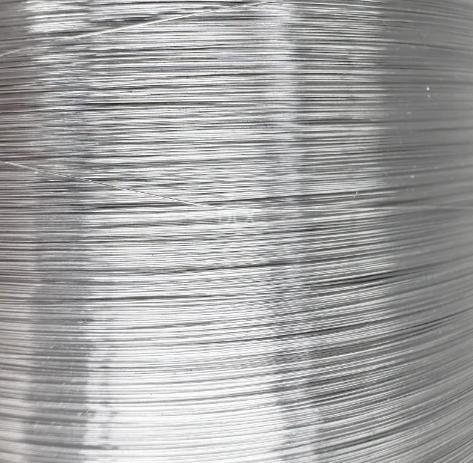Positive Temperature Coefficient wire Thermal Protection Temperature-Dependent Resistance for sale
Positive Temperature Coefficient (PTC) wire is a type of wire that exhibits a positive temperature coefficient of resistance. This means that as the temperature of the wire increases, its electrical resistance also increases. PTC wires are used in various applications due to their unique thermal properties.
| Code | Nickel Content % | Resistivity at 20°C | Temperature Coefficient(ppm/°C) |
| NF13 | 85-95 | 0.13 | 4300 |
| NF15 | 75-85 | 0.15 | 4400 |
| NF20 | 70-75 | 0.20 | 4200 |
| NF23 | 60-65 | 0.23 | 4600 |
| NF25 | 60-65 | 0.25 | 4500 |
| NF32 | 50-55 | 0.32 | 4100 |
| NF36 | 50-55 | 0.36 | 3600 |
| NF38 | 50-55 | 0.38 | 3900 |
| NF40 | 50-55 | 0.4 | 3500 |
| NF43 | 45-50 | 0.43 | 3300 |
| NF46 | 45-50 | 0.46 | 3200 |
| NF52 | 45-50 | 0.52 | 2200 |
| NF60 | 45-50 | 0.60 | 2500 |

Characteristics of PTC Wire
Temperature-Dependent Resistance:
Positive Temperature Coefficient: The resistance of the wire increases as the temperature rises. This characteristic is useful for temperature sensing and control applications.
Self-Regulating:
Thermal Protection: PTC wires can act as self-regulating Heating Element s. As the wire heats up and its resistance increases, the current passing through the wire decreases, which helps to prevent overheating.
Material Composition:
PTC wires are often made from materials like polycrystalline ceramics or conductive polymers. These materials inherently exhibit PTC behavior.
Electrical Properties:
Initial Low Resistance: At low temperatures, PTC wires have relatively low resistance.
High Resistance at Elevated Temperatures: At higher temperatures, the resistance increases significantly, which can limit current flow.
Applications
Overcurrent Protection:
Fuses: PTC wires are used in resettable fuses or polymeric PTC thermistors to protect electronic circuits from overcurrent conditions. When the current exceeds a certain threshold, the resistance increases, limiting the current and protecting the circuit.
Heating Elements:
Self-Regulating Heaters: In heating applications, PTC wires can be used to create self-regulating heating elements. As the temperature rises, the resistance increases, reducing the heat output and preventing overheating.
Temperature Sensing and Control:
Thermistors: PTC wires can be used as temperature sensors in various devices. Their resistance change with temperature allows for accurate temperature measurement and control.
Temperature Compensation:
Electronics: PTC wires are used in electronic circuits for temperature compensation, where changes in resistance help to stabilize circuit performance under varying temperature conditions.
Automotive Applications:
Defrosters: In automotive applications, PTC wires are used in defroster systems to provide controlled heating for windshield defrosting and other purposes.
Advantages
Self-Regulating Heating:
Reduces the risk of overheating by automatically adjusting heat output in response to temperature changes.
Resettable Protection:
Provides resettable overcurrent protection, eliminating the need for fuse replacement.
Enhanced Safety:
Reduces the risk of thermal runaway and damage to electronic components due to its temperature-dependent resistance.
Maintenance and Care
Temperature Range: Ensure the wire operates within its specified temperature range to avoid damage.
Installation: Proper installation is crucial to ensure reliable operation. Follow manufacturer guidelines for wiring and placement.
Inspection: Regularly inspect for signs of wear or damage, especially in applications where high temperatures are involved.

FAQs
Q:I have sent the RFQ, when can I expect a reply?
A:We usually quote within 24 hours after we get your inquiry. If you are urgent to get the price, please send the message on trade management or call us directly.
Q:How long is the delivery time?
A:It depends on the order quantity ,Usually it takes about 20-30 days.
Q:Do you accept OEM/ODM manufacturing?
A:Yes! We do accept OEM/ODMmanufacturing. You could give us your samples or drawings.
Q:Can you send me your catalogue?
A:Yes, please contact us.We can share with our catalogue for you by email.
Q:How to control the products quality in your company?
A:With professional quality team, advanced product quality planning, strict implementation, continuous improvement, the quality of our products is well controlled and consistent.
Q:Can you provide detailed technical data and drawing?
A:Yes, we can. Please tell us which product you need and the applications, we will send the detailed technical data and drawing to you for your evaluation and confirm.
Q:How do you handle pre-sales and post-sales?
A:We have a professional business team that will work one-on-one with you to protect your product needs, and if you have any questions, he can answer them for you!
Q:Can I visit your factory before we place an order?
A:Yes, you are welcome to visit our factory. We are very pleased if we have the chance to know more about each other.



